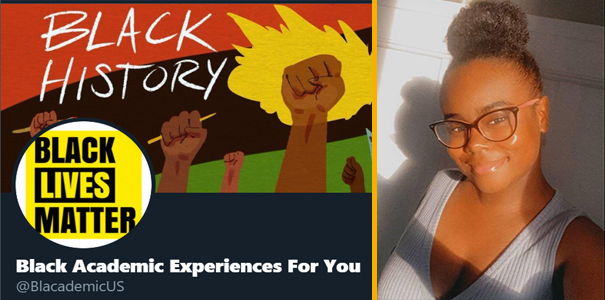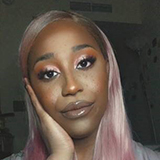
Joelle Jenkins is a busy person. Not only is she a senior at the University of Northern Colorado majoring in Environmental and Sustainability Studies and minoring in Africana Studies and Biology, but she's also the president of UNC's Student Leadership for Environmental Action Fund (Student LEAF), a student-led organization aiming to bring more sustainable practices to the campus community through empowerment and education.
Top image:BlacademicUS Twitter homepage and Joelle Jenkins, the founder of the Twitter account.
Follow @blacademicusIf that wasn't enough, in June, she founded the BlacademicUS Twitter account that shares resources and stories of Black people in academia; it has already gained over 1,200 followers.
"In high school, I didn't have the resources I needed to see what other Black students went through based on their college experience, something like a reference guide," she said. "Then, with Black Birders Week happening, I thought it was a good idea to start something like that."
On Twitter, users can share posts with specific hashtags to join a trending topic. An example is Black Birders Week, where Black bird watchers shared photos and other content regarding birds using the hashtag #BlackBirdersWeek on Twitter.
Being part of the BlackAFInSTEM group on Twitter, Jenkins says she was influenced by this and other Twitter content, later creating the "Twitter page to be kind of a guide mainly for Black students."
The account is managed by four students, each bringing their own academic backgrounds to the platform:
- Jenkins focuses on sharing content regarding ecology and environmental justice.
- Terra Ware, a UNC student studying Biology with a Pre-Health emphasis, shares content on gender and sexuality advocacy.
- Liad Sherer, a 2020 UNC graduate who studied History with an emphasis in Secondary Education, shares historical content.
- Veronica Mixon, a student at the University of Alabama studying Psychology with an emphasis in Clinical Mental Health and African American Studies, shares health and wellness content.

Ware
Sherer
Mixon
"I wanted to create something where all Black academics could come together and share their experiences because there's not one page everyone can come to and just learn from. Like, who knows what a high schooler may want to go into? It could be psychology, it could be biology, and so, I just wanted to create that platform," Jenkins said.
Jenkins has plans to utilize ongoing, trending hashtags on Twitter to include more diverse voices and perspectives in the mix. One such ongoing hashtag is #FilmFriday, so Sherer, who is studying History, would find videos regarding Black history and problems Black people face in the U.S. (or something similar) to post to the account using that hashtag.
Mixon, who is studying psychology, would create and share fliers and graphics on topics related to the #MentalHealthMonday hashtag.
The long-term goal of BlacademicUS is to grow its followers, raise awareness and create different chapters at universities across the U.S. "I think this would be a very helpful tool for Black students and institutions trying to create a more inclusive environment for Black students," Jenkins said.
Shining a Light on Resources and Needs
She and the BlacademicUS team are also planning to share student spotlights with the student's academic details as well as personal experiences, such as what they wish was different at their university.
Jenkins' UNC experiences have influenced her passion for starting this project and bringing awareness about the issues and experiences of people of color on campus.
One of the main reasons she chose UNC's Environmental and Sustainability Studies program was because faculty members strive to connect both objective and subjective matters to issues happening in the U.S, including racial injustices and environmental concerns.
"People are used to separating the two, and when you do that, you fail to acknowledge issues that come up in the United States, you try to avoid acknowledging them, or it's easier to avoid," Jenkins said. "[Environmental and Sustainability Studies faculty members] teach you the skills you need, but they also teach you to care about people and their values."
UNC has numerous resources and cultural events on campus to help students of color find a safe and inclusive community. Jenkins recommends some of the resources Black students can look into:
- McNair Scholars Program: A "very good program for people of color who are seeking to move up in higher education," says Jenkins, who is a scholar in the program. She recommends that students of color in their first and second year at UNC keep an eye out for this program because it helps them "get in a mindset that helps them focus on what they want to do with the rest of their life and have a support system to help them achieve those academic goals."
- Supportive faculty members: Chelsie Romulo, Ph.D., an assistant professor in the Environmental and Sustainability
Studies program, is Jenkins' mentor for Student LEAF, as well as her academic and
research advisor.
"Chelsie has been really helpful with a lot of things: She's a really great advisor, and she, in more ways than others, understands my role as a Black woman. We can bond on a different level because she's also a woman of color, so having that bond is great," she said.
- Student Success Center in Candelaria Hall: "They're really helpful and have many resources for students. You can do homework, you can just relax in there … it's a welcoming environment, and it's a safe space to talk about race and other stuff, too," she said.
- Marcus Garvey Cultural Center (MGCC): MGCC hosts numerous events throughout the school year and "provides a safe space for Black students." Jenkins also got the opportunity to run her research through the MGCC.
- Bear Pantry: Students who are facing food insecurity can pick up essential items, including food and personal care items. "Bear Pantry is one of the most appreciated resources students have on campus."
Jenkins also recommended other student organizations, including African Students United and Black Student Union.
Jenkins says she chose UNC because she wanted to stick close to home and knew other Black students at UNC. She says the smaller size (compared to other universities in the area) helped her feel more confident in making decisions for her academic career.
Regarding UNC's recent budget cuts, she said that programs like Africana Studies and Mexican American Studies should be prioritized as safe spaces for students of color, where professors of color are readily available.
"Universities should really consider keeping and allowing those departments to thrive and develop on their own, giving them a sense of autonomy," Jenkins said. "If they want to merge with other departments to create an all-serving source for students of color, I think that would be good, too, but there just needs to be more autonomy, and that's the main thing."
As far as an area for potential growth, Jenkins said there's a need for more Black therapists or therapists of color at the UNC Counseling Center.
"We want a Black therapist to talk about our issues because we don't want to feel criticized or challenged on our experiences," she said. "That's extremely important."
Learn more:
- Blacademic Twitter account
- Student LEAF at UNC
- UNC Africana Studies
- UNC Environmental and Sustainability Studies
- Marcus Garvey Cultural Center
- Bear Pantry
- Student Success Resource Center
- McNair Scholars Program
--Written by Katie Corder.

